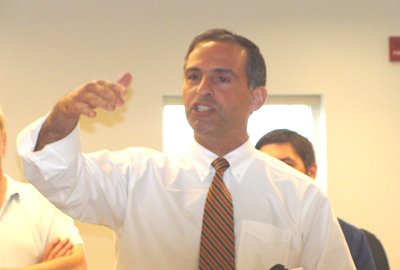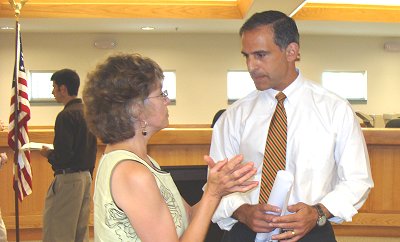- By Dan Veaner
- News
 Print
Print  Arcuri Says Amendment Will Strip Sweetheart Deal
Arcuri Says Amendment Will Strip Sweetheart DealFrom Oil/Gas Drilling Companies
“Say you are a farmer building a new barn on your property, or a homebuilder developing a new subdivision, or for that matter, building a single home-you need a stormwater runoff permit from the EPA before you can begin anything," said U.S. Congressman Michael Arcuri Tuesday. "It's mind-boggling that every single form of development and construction requires a permit from the EPA to ensure our surface water is protected from contamination except for oil and gas drilling and exploration sites.”
Arcuri was in Dryden to talk about the amendment he successfully introduced to the Oil Spill Accountability and Environmental Protection Act of 2010 (H.R. 5629) in the House Transportation and Infrastructure Committee on July 1st. The amendment strips what Arcuri called a 'sweetheart deal' from oil and gas drilling companies that were exempted in 2005 from getting a permit to handle storm water on drilling sites.
 Arcuri announced the passage of his amendment at Dryden Town Hall Tuesday, while flanked by local legislators |
Arcuri represents New York's 24th district, which includes Lansing, says he has been working with Congressman Maurice Hinchey, whose district includes Ithaca, to insure that New York's environment is protected. While Hinchey is working on the fracking issue, Arcuri took on storm water enforcement.
Arcuri says that removing trees and foliage from drilling construction sites increases the runoff that could pollute our streams and lakes significantly. Forcing drillers to obtain a storm water permit will make them responsible for diverting storm water around drilling sites so that pollutants, silt, and other materials are less likely to be carried along with the water.
Arcuri says that requiring the companies to manage storm water will put the financial burden on companies that make significant profits from oil and gas. The amendment takes it off local taxpayers who don't stand to see any benefit from the drilling, and who could additionally be forced to live with long-term consequences. One potential cost is in wastewater treatment where local ratepayers would suffer increases as local plants struggle to deal with added sediment.

Arcuri discusses issues with Tompkins County Legislature
Chair Martha Robertson
"We're not looking to hurt the oil companies," he said. "We want energy to be as cheap as it possibly can. but on the other hand we want to make sure that the environment that we live in and our children will inherit is suitable for human habitation."
Arcuri says that passing the amendment in committee is only the first step in passing it into law. He says he anticipates a fierce battle when it goes to the floor of Congress, and notes that he has already heard rumblings that oil companies and their supporters are planning to fight it.
"During the committee debate the opposition argued that this is simply more regulation," Arcuri said. "You know what? They're exactly right. And it's not such a bad thing. That's what you're supposed to do in government. We all want to streamline the system. We all want to make sure we are not having over-excessive regulation, but lets face it: if we had a little more regulation with the BP oil spill we wouldn't be in the situation we are in there now."
In an election year, that could mean fewer campaign contributions from big business, but Arcuri shrugged the issue off, saying "You do what you've got to do."
The Congressman stressed that enforcement should not be shifted onto the shoulders of local municipalities like Lansing. He says the amendment takes the one federal enforcement agency -- the EPA (Environmental Protection Agency) -- that should have an impact on all construction sites that may impact the environment, and gives it the authority to monitor stormwater runoff.
"We shouldn't just dump this on the shoulders of the localities," he said. "They're probably not in the best position to do it. They're not large enough. They don't have the resources to do it. We have to make sure that the EPA and the DEC are in the kind of position to do it. We need to take the gloves off. We can't ask the EPA to regulate something and not give them the ability to actually do it."
Arcuri noted that New York has been more proactive than neighboring Pennsylvania in considering how oil and natural gas drilling sites should be monitored and regulated. He says that changing the law at the federal level puts New York on a level playing field, because runoff water doesn't respect state borders. If Pennsylvania and New York are regulated under the same rules, runoff from one state won't become the problem of its neighbor.
"As the BP spill in the Gulf Coast has shown us, attempts to fast-track development creates a potential for environmental hazards," he said. "This potential is not unique to offshore drilling."
----
v6i26



